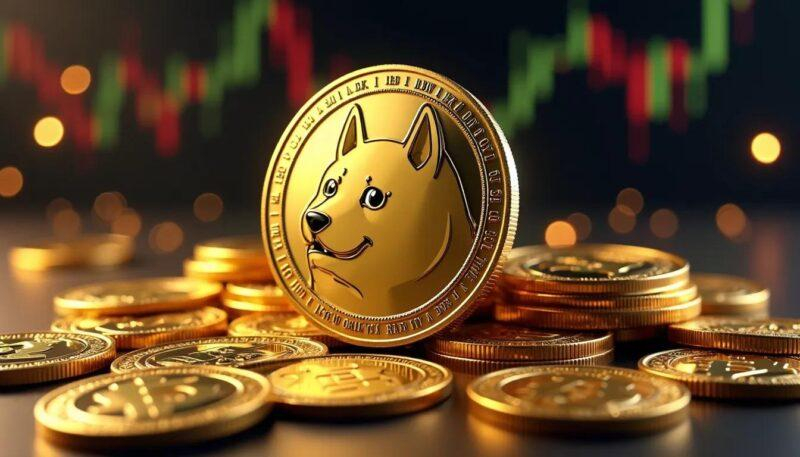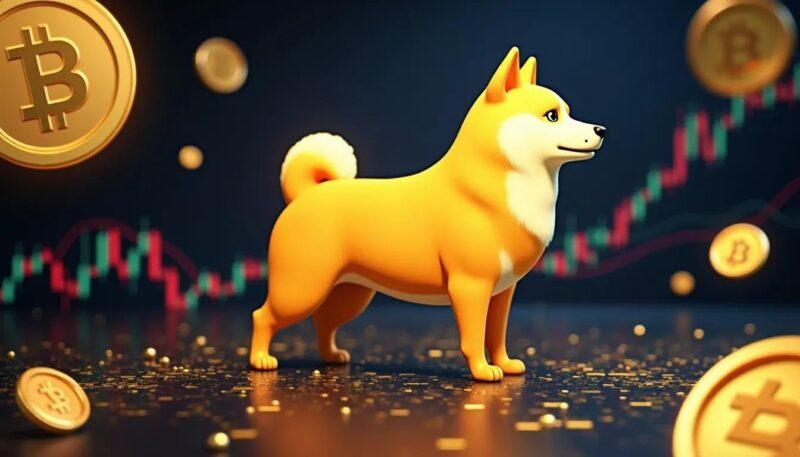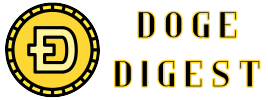In the ever-evolving landscape of digital finance, peer-to-peer (P2P) transactions are reshaping how we exchange value-cutting out middlemen and putting control back into users’ hands. Among the myriad cryptocurrencies leading this change, Dogecoin stands out not just for its quirky origins, but for its growing utility as a straightforward, accessible medium for digital payments. This article delves into how Dogecoin’s P2P transactions simplify the process of sending and receiving money online, making digital peer payments more user-friendly, efficient, and inclusive for all.
Understanding Dogecoin and Its Role in Peer-to-Peer Payments
Emerging from the vibrant world of cryptocurrencies, Dogecoin stands out as a practical solution for everyday digital payments. Unlike many cryptocurrencies that focus heavily on investment speculation, Dogecoin embraces simplicity and accessibility, making peer-to-peer (P2P) transactions effortless. Its decentralized network allows users to send and receive payments quickly without relying on traditional banking systems, enabling frictionless interactions across borders.
What truly distinguishes Dogecoin is its underlying technology combined with its community-driven spirit. Transactions on the Dogecoin network confirm in about a minute, striking a balance between speed and security. This efficiency empowers anyone-from casual users tipping content creators to small businesses accepting digital payments-to take part in a borderless economy with minimal fees. The ecosystem thrives on:
- Fast transaction times that reduce waiting periods compared to many other cryptocurrencies.
- Low fees making micropayments viable and attractive.
- Robust decentralization that ensures trust without intermediaries.
- Active community support promoting usability and adoption worldwide.
To illustrate Dogecoin’s efficiency in P2P payments, consider this comparison of average transaction metrics:
| Feature | Dogecoin | Bitcoin | Ethereum |
|---|---|---|---|
| Avg. Confirmation Time | ~1 minute | ~10 minutes | ~15 seconds |
| Avg. Transaction Fee | ~$0.01 | ~$1.50 | ~$3.00 |
| Primary Use Case | Micro & peer payments | Store of value & large transactions | Smart contracts & dApps |
With these attributes, Dogecoin is carving out a niche as the go-to cryptocurrency for straightforward, reliable peer-to-peer transactions. Its design philosophy and real-world usability continue to democratize digital payments, making them accessible to anyone with an internet connection.
Key Advantages of Using Dogecoin for Digital Transactions
Speed and Efficiency are at the heart of Dogecoin’s appeal, especially when it comes to peer-to-peer digital payments. Unlike traditional banking systems that can take days to process a simple transfer, Dogecoin transactions are verified within minutes. This rapid confirmation means users experience virtually no waiting time, making everyday payments seamless and more practical for real-time exchanges.
Another standout benefit lies in its low transaction fees. While many cryptocurrencies can burden users with hefty charges during peak network activity, Dogecoin maintains minimal costs. This affordability makes it an excellent choice for micropayments or frequent transactions, enabling everyone from casual spenders to small businesses to transact without worrying about overhead costs eating into their payments.
Security and accessibility are also pivotal. Built on a robust blockchain, Dogecoin ensures transactions are safe and transparent. Additionally, its widespread adoption and integration with popular digital wallets mean users don’t have to jump through hoops to get started. Accessibility combined with reliable security fosters trust and encourages broader use for everyday digital payments.
| Feature | Benefit |
|---|---|
| Transaction Speed | Confirmed in ~1 minute |
| Transaction Fees | Less than $0.01 per transfer |
| Security | Encrypted and decentralized |
| Accessibility | Supported by multiple wallets |
Overcoming Common Challenges in Dogecoin P2P Transfers
While Dogecoin P2P transfers offer a seamless and cost-effective way to send value, users often face a few hurdles that can interrupt smooth transactions. One common issue is network congestion, where too many simultaneous transactions slow down processing times. Patience and timing your transfer during off-peak hours can alleviate delays. Additionally, ensuring your wallet software is up to date minimizes compatibility issues that may arise from protocol changes or security updates.
Security remains a top concern in P2P transfers. Avoiding phishing attempts and double-checking recipient addresses are crucial steps to safeguard your assets. Since Dogecoin transactions are irreversible, a minor typo could lead to permanent loss. To simplify this, many users leverage QR code scanning or contact lists within wallet apps, significantly reducing manual errors.
Another challenge is the variability in transaction fees, which can confuse new users. Though Dogecoin is known for low fees, sudden spikes occasionally occur. Below is a quick guide to typical fees and transaction speeds to help you plan better:
| Fee Level | Approximate Cost (DOGE) | Expected Confirmation Time |
|---|---|---|
| Low | 0.01 – 0.05 | 10+ minutes |
| Standard | 0.05 – 0.1 | 3-10 minutes |
| High Priority | 0.1+ | Under 3 minutes |
- Verify recipient address before confirming transfers
- Use secure networks to avoid interception
- Monitor fees to optimize transaction speed and cost
Best Practices for Secure and Efficient Dogecoin Transactions
Ensuring security during Dogecoin transactions starts with the basics: always use a trusted and updated wallet. Whether you prefer a desktop, mobile, or hardware wallet, verifying the integrity of the software before sending or receiving coins can save you from potential loss. Remember to enable two-factor authentication (2FA) and regularly back up your wallet’s private keys or seed phrases. This simple discipline significantly reduces the risk of unauthorized access or accidental loss.
When initiating payments, an important best practice is to double-check recipient addresses. Given the irreversible nature of P2P transfers, one wrong character could mean sending funds to the wrong user permanently. Utilize QR code scanning or copy-paste with extra caution. Additionally, it helps to perform smaller test transactions for new contacts before transferring larger amounts, ensuring that everything works smoothly and the recipient correctly receives your Dogecoin.
Efficiency in transactions can be optimized by considering network conditions and fees. Dogecoin’s blockchain is known for quick confirmations, but during times of high congestion, setting an appropriate transaction fee can speed up processing without overspending. Below is a quick reference guide to help balance speed versus cost:
| Priority | Suggested Fee (DOGE) | Estimated Confirmation Time |
|---|---|---|
| High | 0.01 DOGE | Under 5 minutes |
| Standard | 0.005 DOGE | 10-20 minutes |
| Low | 0.001 DOGE | 30+ minutes |
Implementing these steps not only safeguards your funds but also ensures a smooth and pleasant peer-to-peer payment experience within the Dogecoin community.
Future Trends Shaping Dogecoin’s Peer Payment Landscape
As Dogecoin continues its journey beyond a meme-inspired cryptocurrency, innovations in its peer-to-peer payment ecosystem are paving the way for more seamless and user-friendly transactions. Among these, the integration of layer-two scaling solutions promises faster transaction speeds with even lower fees, ensuring micro-transactions become more practical and widespread. Coupled with the rise of decentralized finance (DeFi) platforms, Dogecoin is positioning itself as a versatile medium for not only casual tipping but also for more complex financial interactions.
Advancements in cross-chain interoperability are also set to redefine how Dogecoin interacts with the broader crypto landscape. Through bridges and atomic swaps, users can expect to transfer value effortlessly between Dogecoin and other major cryptocurrencies without relying on centralized exchanges. This capability will unlock a new era of decentralized peer payments where users enjoy enhanced flexibility and control over their digital assets, eliminating friction commonly associated with multi-currency transactions.
Looking ahead, the integration of smart contracts tailored for Dogecoin-based payments is on the horizon, allowing programmable transactions that react automatically to predetermined conditions. This evolution will enable features such as:
- Automated escrow services for secure peer-to-peer deals
- Subscription models powered by seamless recurring Dogecoin payments
- Customizable payment channels that manage micro-payments in real-time
These emerging capabilities hint at a future where Dogecoin transcends simple transfers, becoming a robust tool for diverse digital financial interactions within peer-to-peer networks.
| Trend | Impact | Timeline |
|---|---|---|
| Layer-Two Scaling | Near-instant transactions, minimal fees | 2024 – 2025 |
| Cross-Chain Bridges | Smooth asset transfers across networks | 2024 – 2026 |
| Smart Contract Integration | Programmable, conditional payments | 2025 and beyond |
Q&A
Q&A: Dogecoin P2P Transactions – Simplifying Digital Peer Payments
Q1: What exactly are Dogecoin P2P transactions?
A1: Dogecoin P2P transactions refer to direct digital payments sent from one person to another using Dogecoin (DOGE), a popular cryptocurrency originally created as a playful alternative to Bitcoin. These transactions bypass traditional intermediaries like banks, enabling users to transfer value quickly and securely across the globe.
Q2: How does Dogecoin simplify peer-to-peer payments compared to traditional methods?
A2: Traditional payments often involve fees, delays, and reliance on third-party institutions. Dogecoin P2P transactions cut through this by allowing instantaneous transfers with minimal fees, no gatekeepers, and without requiring extensive paperwork or approval processes. The blockchain technology that underpins Dogecoin ensures transparency and security, making transactions straightforward and efficient.
Q3: Why choose Dogecoin over other cryptocurrencies for P2P payments?
A3: Dogecoin stands out due to its fast transaction confirmation times and exceptionally low fees. While many cryptocurrencies can become costly or slow during high network demand, Dogecoin’s infrastructure keeps the payment process fluid and accessible. Additionally, its vibrant community and widespread acceptance on various platforms make it a practical choice for everyday peer payments.
Q4: Are Dogecoin P2P transactions safe?
A4: Yes, Dogecoin transactions are secured by blockchain technology, which uses cryptographic principles to guard against fraud and double-spending. While the network itself is secure, users must practice good digital hygiene-like protecting private keys and using trusted wallets-to ensure their funds remain safe.
Q5: Can I send Dogecoin P2P to anyone in the world?
A5: Essentially, yes. As long as the recipient has a Dogecoin wallet address, you can transfer DOGE to them regardless of geographic location. This global accessibility empowers users to send payments without the usual barriers posed by currency exchange or financial institutions.
Q6: What are some real-world uses for Dogecoin P2P transactions?
A6: Beyond tipping content creators or sending small gifts, Dogecoin P2P payments can facilitate peer-to-peer sales, split bills among friends, pay freelancers internationally, or donate to charitable causes. Its low cost and speed make it ideal for microtransactions and everyday digital exchanges.
Q7: How do I get started with Dogecoin P2P payments?
A7: Begin by setting up a Dogecoin wallet-many options are available as mobile apps, desktop programs, or hardware devices. After acquiring Dogecoin through exchanges or peers, simply enter the recipient’s wallet address and the amount you wish to send. Confirm the transaction, and the blockchain will handle the rest.
Q8: What challenges does Dogecoin face in expanding its P2P payment use?
A8: Despite its strengths, Dogecoin must overcome scalability concerns and broader merchant adoption to become a universal payment method. Market volatility and regulatory uncertainty can also impact user confidence. However, ongoing development and enthusiasm from the community continue to drive its evolution.
Q9: How does Dogecoin P2P payment impact the future of digital finance?
A9: By lowering barriers to seamless, cost-effective peer payments, Dogecoin exemplifies a shift towards decentralized, user-empowered financial interactions. Its model hints at a future where money flows effortlessly between individuals worldwide-without banks or borders slowing it down. Dogecoin’s story is part of the broader narrative transforming digital finance into something more inclusive and dynamic.
Whether you’re a digital nomad, a casual tipper, or just curious about cryptocurrency, Dogecoin’s peer-to-peer transactions offer a fresh, simplified way to exchange value in today’s connected world.
In Conclusion
As the landscape of digital payments continues to evolve, Dogecoin’s role in simplifying peer-to-peer transactions highlights a growing shift toward accessible, community-driven currencies. By embracing speed, low fees, and ease of use, Dogecoin not only makes transferring value between individuals straightforward but also invites a broader audience to engage with the world of cryptocurrencies. While challenges remain, the path forward promises a future where sending a token of trust is just a few clicks away-effortlessly bridging gaps between digital wallets and real-world connections.






